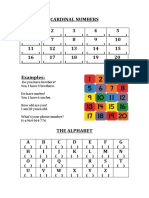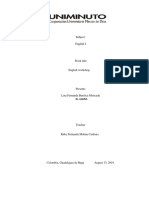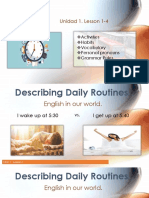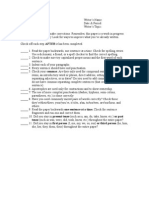MINISTERIO DE EDUCACIÓN
DIRECCIÓN REGIONAL DE EDUCACIÓN DE VERAGUAS
INSTITUTO PROFESIONAL Y TÉCNICO DE VERAGUAS
MÓDULO DE INGLÉS -1
NIVEL 10° GRADO
Estudiante__________________ Grupo_____________
NOMBRE DE GRUPOS CELULAR/WHATSAPP CORREO ELECTRÓNICO
LA
PROFESORA
YANIBEL J, K, L, 66035326 YANIBA14@GMAIL.COM
HERNÁNDEZ M, N, Ñ YANIBEL.HERNANDEZ@MEDUCA.EDU.PA
T-YANIBA.JIMDO.COM
MADELEINE 63516202 MADELOINE.JUAREZ@MEDUCA.EDU.PA
JUÁREZ SONELLYJ@GMAIL.COM
R, S, T, 60464779 SANDERCISNEROS@GMAIL.COM
SANDRA U, V, W,
CISNEROS X.
SARA SUIRA O, P, Q 6855-0180 SARASUIRA13@GMAIL.COM
QUINTERO
KENIA D, E, F, 68526865 UFFERSR@GMAIL.COM
HERRERA G, KENIA.HERRERA@MEDUCA.EDU.PA
H, I
MARZO 2021
1
�Los estudiantes deben realizar las prácticas contenidas y señaladas en
este módulo y entregarlo una semana antes de finalizar el primer
trimestre. En la imagen siguiente puede observar el calendario escolar
2021 tome muy en cuenta esta información porque si no entrega en las
fechas establecidas se queda sin nota, casilla en blanco, y el reclamo deberá
ser sustentado.
PRIMER TRIMESTRE SEGUNDO TRIMESTRE TERCER TRIMESTRE
PERIODO DE CLASES PERIODO DE CLASES PERIODO DE CLASES
Lunes 1 de marzo al Viernes 4 de Lunes 14 de junio al viernes 3 de Lunes 13 de septiembre al
junio 2021. septiembre de 2021 viernes 17 de diciembre de 2021
RECESO ESCOLAR RECESO ESCOLAR BALANCE DE ACTIVIDADES Y
Lunes 7 al viernes 11 de junio de Lunes 6 al viernes 10 de septiembre de GRADUACIONES
2021 2021
Para garantizar el derecho a la Se evaluará periódicamente con el Minsa Lunes 20 al jueves 30 de
salud y la Educación, el primer las condiciones epidemiológicas de cada diciembre de 2021
trimestre se desarrollará bajo la región educativa para valorar la
modalidad de educación a transición a otras modalidades en el
distancia. segundo y tercer trimestre.
A continuación, se mostrarán las páginas del módulo de inglés del primer trimestre y las
respectivas indicaciones de cada página. Si algo no entiende debe utilizar su diccionario
inglés- español u otro mecanismo para la traducción y pueda comprender. El/ la
estudiante debe realizar todas las practicas señaladas en las instrucciones de cada
página. Sea muy cuidadoso al completar y use letra legible.
Actividades a realizar en el primer trimestre.
Nº Tema ( topics) Actividades
3&4 -Verificar lista de saludos y despedidas en ingles
Greetings, Farewells &…
-Completar un dialogo
5 Verb Be -Verificar las formas del verbo to be.
-Completar con la forma correcta del verbo to be
6 Simple present tense -Escribir la forma correcta del verbo y unir
imágenes con las oraciones.
-Escribir oraciones en forma negativa
7&8 My routines -leer el parrafo y completar los espacios en blanco.
-Responder preguntas de la lectura.
9 The articles -Completar las actividades sugeridas.
10 Adverbs of frequency -Completar las oraciones con los adverbios.
11 &12 There is/ there are -Observar las imágenes y completar los espacios.
13 & 14 Countable and uncountable -Escribir si el sustantivo es C contable o No.
2
� Greetings, Farewells and Small Talk
This worksheet will give you a variety of ways you can say
‘Hello’, ‘Bye’ or just small talk while you are out and about.
Nice to meet you
Good morning Good-Bye
Glad to meet you
Good afternoon Bye
Pleased to meet you
Good evening Hello Bye-bye
It’s a pleasure to meet you
Hi See You soon
Hello See you later
Hi there! See you tomorrow
How are things? cheerio
Long time, no see Take care
Haven’t seen you for ages Good night
Great to see you again Tara
Nice to meet you Have a nice day
How are you?
Have a good weekend
How are you doing?
I feel great
How are things? Not so good Welcome
Very well, thank you
How’ s everything? Not so great Thank you
I’ m okay
How`s it going? I am poorly Thanks
All right
How do you do? I am tired You’re
Excellent
welcome
I feel awful
Not bad
Please
A bit better
Can`t complain
Sorry
Excuse me
Good luck
3
� Let’s practice
1 Hello!
B: Hi. What’s your name?
A: My name’s Jack.
2
A: Goodbye.
B: Goodbye!
3
A: Hi
B: Hello.
A: I’m Orion. What’s your name?
B: My name’s Emily.
4
A: What’s your name?
B: Willy.
A: Goodbye Willy.
2) Complete the dialogue:
A: _________!
B: _________!
A: What’s your _________?
B: My name’s _________, and you?
A: ______ Josh.
B: _________ to meet you!
A: Nice to _________ you too.
B: Goodbye!
A: Have a nice _________!
4
� Verb to Be
I am a student. I am hungry!
You are a girl.
John is angry.
He is a teacher.
She is beautiful!
She is a journalist.
It is a book. The chair is green.
We are mechanics. We are from Italy.
You are pilots.
They are policemen. You are my friend.
The students are in the auditorium.
Contractions of the verb "to be"
The verb "to be" is often contracted in the present tense when it occurs after
pronouns and nouns.
Contraction Meaning
I'm I am
you're you are
he's, she's, it's he is, she is, it is
we're we are
they're they are
Exercise:
1) Complete with the right form of the verb to be:
a. They _________ at the store.
b. The boy _________ sick.
c. I _________ very tired today.
d. You _________ a good soccer
player!
e. We_________ friends.
d. She _________ my sister, Jane.
e. It _________ my pencil.
d. My brother _________ here right
now.
e. They _________ from England.
f. It _________ Monday today.
g. I _________ a student.
h. My mom _________ very nice.
5
� Simple Present tense
The spelling of third person Affirmative and negative form
-is used when we talk about habits:
singular:
I get up at 6 every morning.
- to express a fact that stays for a I go do not go (don’t)
-add –s to the base form of the verb
long time(state): We live in the USA.
You do don’t do
(wants,eats,reads,writes,helps..)
- always true about a person or
He drives does not
about the world: The sun rises in the -add –es when the verb end in drive(doesn’t
east. ss,sh,ch,x,o..
She cooks doesn’t cook
It rains a lot in Britain. (kisses, goes,fixes,watches,washes)
It eats doesn’t eat
-end in a consonant+y change to –
ies We help don’t help
-adverbs of frequency: always,
usually, often, sometimes,never… (carry-carries, fly-flies) You kiss don’t kiss
-every day/year/month/ BUT: vowel+y are normal: They walk don’t walk
morning/night…
buy-buys, say-says
PRACTICE
I. Write the correct verb form and match the sentences to the pictures.
1. He _________ golf in the park.
Question form: 2. We _________ a bike.
3. Alice _________a bath in the cold water.
Do I get up so early? 4. Our bus _______ work.
5. Jeff ________________ in the bar.
Yes, I do. /No, I don’t.
6. We ___________ to walk tour.
7. Mike _______ volleyball at the beach.
8. Dolphin ________ fish.
Does she cook every evening, 9. They __________ about the summer holiday.
10. Alex __________ water sports. 6
Yes, she does. /No, she doesn’t.
Do they go on holiday?
� II.Write the following sentences into negative form.
1.____________________________________
2.____________________________________
3.____________________________________
4.____________________________________
5.____________________________________
6.____________________________________
7.____________________________________
8.____________________________________
9.____________________________________
10.___________________________________
My routines
Instructions:
III.Read the following paragraph and complete it with the correct form of the
verbs
Hi! Everybody! My name is Gerald. This is my first year at the
University. I ___________ 1(be) from England. I
____________ 2(not – work). I just _____________ 3(study)
to be Computer software Engineer. I _______________ 4(have)
two sisters. I _____________ 5(not – have) any brother. Karla,
the oldest, _____________ 6(work) as a pharmacist. She
_____________ 7(have) one daughter. Mariam, the youngest,
______________ 8 (attend) to kínder garden.
Mr Anderson is my Computer teacher. He
______ 9(be) 50 and he ______ 10 (live) in
Chicago with his parents and his twin siblings – Denise and Mike, who
______ 11 (be) 20 years old.
On weekdays, Mr Anderson _______ 12 (wake up) at half past seven. He
_________ 13 (wash) his face, he ____________ 14 (not- comb) his
hair because he is bald, and 15________ (put on) his tie, which he
____________ 16(hate).
7
�My parents ______________ 17 (not – be) from England. They
______________ 18 from (come) Canada. My father ______________
19(not-work) because he’s retired. My mother ______________ 20
(represent) people in a court. She’s a lawyer.
IV. Part. Read the paragraph again and answer the following question in a
long way. Share your answer.
1. What is his name? Is Marian a pharmacist?
______________________________
___________________________________
2. Where does he come from?
______________________________ 7. Does Gerald come from Canada?
3. How old is Gerald? ___________________________________
______________________________ 8. Does Gerald’s father work as a lawyer?
4. What does he do? ___________________________________
______________________________
9. Does Mr Aderson comb his hair? Why?
5. How many siblings does he have?
______________________________ __________________________________
10. Are the twins older than Mr Anderson?
___________________________________
Bibliography: https://en.islcollective.com/
8
�9
�1) Adverbs of Frequency are used to express frequency of an action.
• We sometimes go to the cinema.
• I never ate broccoli when I was a kid.
2) The most common way to use adverbs of frequency is to place them before the main verb,
except the verb "to be".
• I always walk to school.
• Our teacher sometimes gives us homework.
When the main verb is the verb "to be", then the adverbs of frequency come after the verb:
• The bus driver is always friendly.
• My teacher is never late for class.
Practice
10
�Free-English-Grammar-Book-Level-1.pdf (netdna-ssl.com)
11
�M (blogshumanitastorrejon.com)
Count - Non Count (kaisons.org)
12
�13





































































